Chinatown (New York, N.Y.)
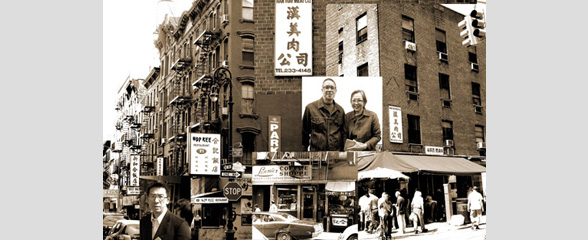
2013.022.008 Oral History Interview with Pamela and Tom Lee
In this oral history husband and wife Tom and Pamela Lee share their experiences living and working in New York Chinatown. Tom and Pamela discuss their childhoods and how they came to live in New York. They both reflect on working at the butcher shop owned by his family. Tom also discusses the farm his father operated along with the tasks his mother completed at their family business. The couple also contemplates how Chinatown has changed over many decades and the cultural differences each generation of Chinese Americans experience.
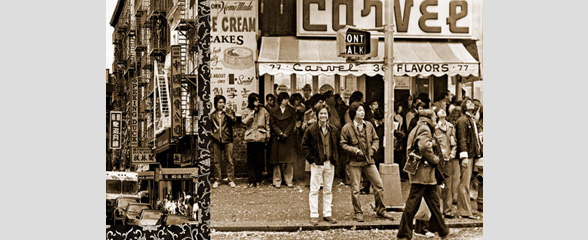
2013.022.009 Oral History Interview with Wing Lee
Tomie Arai and Janice Lau sit down with Wing Lee to discuss his life and his experience growing up in and around New York Citys Chinatown in the 60s through the 80s. Wing talks about what it was like as a kid being raised in the US with Chinese parents, and growing up on the streets of Chinatown. He talks about the schools he went to in the area, and all the spots the neighborhood kids used to hang out. Later on in his late teenage years, he describes the experience at a popular neighborhood bar called Grandpas. Wing describes the atmosphere at Grandpas, the regulars there, and how he was eventually asked to design a t-shirt for the bar as well as a large mirror to hang in the space. He touches on the gang presence in Chinatown in the 70s, and describes the changes he has seen in the neighborhood since his youth. He feels hopeful for the future of Chinatown and believes that the quality of life has improved for your average Chinatown resident. He is excited that the area is now taken seriously politically and that Chinatown has Asian and Chinese representation within the city government. Wing is an artist, and he is excited to see the museum documenting this important community history.
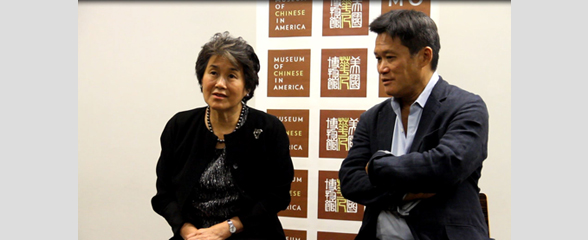
2014.035.003 The Family Journey of The Lee Family
Sandy and Doug Lee sit down with MOCA to discuss the history of their family, as found through archival and family research. They bring up the curio shop that their family kept and finding pictures from this business through a cousin. They discuss the involvement of their father in the U.S. Army and his position as translator for American diplomats who met with Mao and his party. They discuss how their Uncle funded one of the first Chinese-American film companies in the U.S., called Great Wall Films, to challenge American representations of Chinese people in film. They go back to discussing the store on 31 Pell Street, and discuss the beginning and then the history of the store. Their other uncle and their father had insurance and travel businesses in this building as well which still exist today. The businesses in this building grew and changed to adapt to the needs of the growing Chinatown community in San Francisco before the earthquake of 1906. They discuss the impact of the Chinese Exclusion Act on their family, with their relatives having to take long routes to and from China to avoid deportation. The Chinese Exclusion Act was also very isolating for the family, as it prevented them from seeing their other family members back in China. Since their grandmother and grandfather lived in such a dangerous neighborhood at the turn of the century, their grandmother did not go into the street by herself and instead spoke to other women by yelling from fire escape to fire escape. A Church took in their grandmother and taught her American customs and helped with childcare. During the Depression, the family relocated back to Hong Kong with their grandfather staying in Chinatown to run the business. Their father was educated in the U.S. and in Shanghai, which made him valuable as a translator since he knew four dialects of Chinese. Sandy and Doug discuss growing up in Flushing and later Great Neck, Long Island, and their ability to assimilate into American culture. They discuss more family history and then their family’s involvement with MOCA.
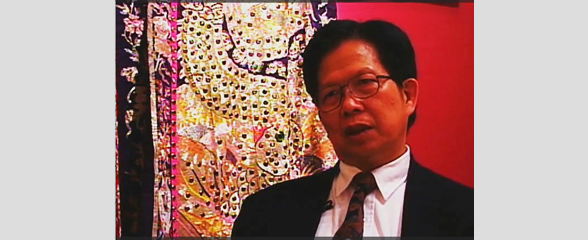
2014.036.002 Oral History Interview with Cambao de Duong November 17, 2003
Cambao de Duong is a Chinese-Vietnamese immigrant born in Saigon, South Vietnam to Chinese parents. Cambao grew up in a multicultural environment and learned to speak Chao Chow, Vietnamese, Cantonese, and Mandarin. He would receive a high level of education in Vietnam, and inspired by one of his principals, became an educator. De Duong would teach at the college level until he received an officer commission in the South Vietnam army. Given his previous service in the South Vietnamese government and army, he was granted refugee status and was quickly approved to relocate to the United States. When Cambao first came to New York City, he decided to work in a non-profit organization, where he assisted Asian immigrants with forms and vocational training. De Duong gradually became heavily involved with social work and community advocacy, becoming co-founder of the Greater New York Vietnamese American Community Association, as well as the Indo-China Sino-American Senior Citizen/Community Center. He makes observations of the changing demographics, crime rate, and sanitation of Chinatown during his decades-long involvement with the local community. De Duong shares his experience in Chinatown during the 9/11 attacks, and notes how similar it was to his experiences in the Vietnam War. He discusses the economic impact of the attacks and goes into detail regarding unemployment and increased requests for social services. Additionally, he observed that while the restaurant businesses in Chinatown mostly recovered two years after the attack, the garment industry will likely not recover.
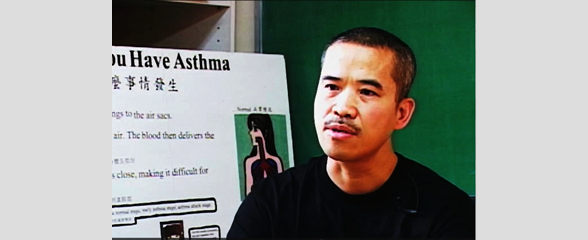
2014.036.003 Oral History Interview with Chris Chan May 24, 2004
Chris Chan is a Chinese immigrant who works for the Chinese Progressive Association (CPA). Born in China, Chris moved to Macau at two years of age following the Communist takeover of China. During his young adult years, he worked as a construction laborer in Hong Kong during the 1970s and 80s construction boom before being sponsored by his sister to immigrate to the United States in 1984. Chris describes the various construction and labor jobs he took on in the early years, the differences between New York City, Chinatown, and Hong Kong, and the challenges he faced as he tried to learn the English language. Chris would become active at the CPA in 1989 and would work for them as an employee in 1992. Chris elaborates on his work at the CPA, emphasizing its services to the local community, including but not limited to immigration rights, citizenship exam and procedure guidance, English classes, local environmental issues, and improving overall community health. In 2002, Chris and the CPA surveyed 580 people in the Chinatown area to study the effects of pollution on the local community and its correlation to asthma symptoms. He states that the CPA attempts to raise awareness of air pollution and dispel misconceptions of asthma in the Chinese community living in Chinatown through an emphasis on educating the population using their study. Chris notes that the 9/11 attack compounded the air quality issues but there are many pre-existing factors that needed addressing to improve quality of life. The discussion following his description of the CPA survey includes their plans to utilize the survey data to continue to educate the populace and to convince other organizations to assist in improving air quality in the Chinatown area.
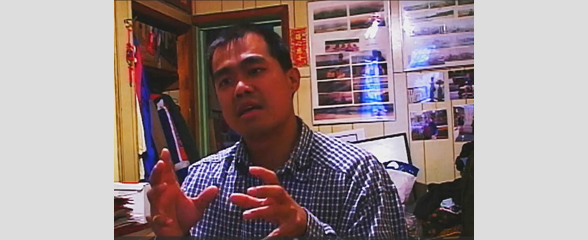
2014.036.004 Oral History Interview with Jami Gong April 26, 2004
Jami (Jameson) Gong is a Chinese American comedian and local Chinatown resident. Born August 23, 1969 in New York City, Jami is the son of immigrant parents from Hong Kong and Southern China. His parents immigrated to the United States in 1967 with a desire for better opportunities and a better life for their children. He reminisces about his time growing up and living in Chinatown, the pollution problem, the changing demographics over time, and the education he and his siblings received. Jami continues on to talk about his time at Syracuse University and his eye opening experience as a college student meeting people from all over the world and being more independent living outside of Chinatown. Jami describes his early experiences doing standup during his time at Syracuse University and how it made him realize that comedy was a career path for him to consider. Jami would continue to do comedy on-and-off while working jobs in New York City until he came to a realization that he could do comedy in Chinatown as a way to revitalize the local economy and nightlife following the 9/11 attacks. The success of TakeOut Comedy and his Chinatown tours would be far reaching, with media coverage from international news groups giving Chinatown recognition as a result of his efforts. Jami also describes his own 9/11 experience of witnessing the towers fall and capturing photos and videos of that particular day. Following the attacks, he noted the negative impact it had on the Chinatown economy and worked to bring back tourism into the Chinatown NYC area through his work as a local tour guide and TakeOut Comedy events. His involvement in Chinatown led him to civil rights activism, leading the local OCA chapter to advocate for equal rights for Chinese Americans. He concludes the interview with his dreams of uniting the world through comedy and what he hopes to achieve in the near future.
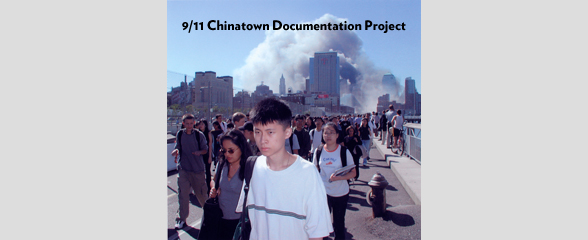
2014.036.007 Oral History Interview with Jeannie Lee Jackson July 13, 2004
Jeannie Lee Jackson is a Chinese American and native New Yorker. She recounts the origins of her seemingly unusual surname for her ethnicity. She recalls her childhood in Brooklyn, growing up as the only Chinese person in her school, working in the family laundry business, and the role Manhattan Chinatown played in her life. As a former member of the Ging Hawk Club, she remembers the social activities she engaged in and how it led to her serendipitous meeting of her husband. Jeannie chronicles raising her children whilst moving to various neighborhoods throughout the city and the change in demographics, affluence, and challenges to the economy. She details effects of crime due to gang activities during the 1970s. She describes starting the Chinese American Lioness Club and how the service organization improved the social welfare, public safety, and health care amongst senior citizens. She recalls the momentous events of September 11th and its impact on the city but specifically Manhattan Chinatown. She describes the confusion, fear, and how the neighborhood came together in its aftermath.

2014.036.007 Oral History Interview with Jeannie Lee Jackson July 13, 2004
Jeannie Lee Jackson is a Chinese American and native New Yorker. She recounts the origins of her seemingly unusual surname for her ethnicity. She recalls her childhood in Brooklyn, growing up as the only Chinese person in her school, working in the family laundry business, and the role Manhattan Chinatown played in her life. As a former member of the Ging Hawk Club, she remembers the social activities she engaged in and how it led to her serendipitous meeting of her husband. Jeannie chronicles raising her children whilst moving to various neighborhoods throughout the city and the change in demographics, affluence, and challenges to the economy. She details effects of crime due to gang activities during the 1970s. She describes starting the Chinese American Lioness Club and how the service organization improved the social welfare, public safety, and health care amongst senior citizens. She recalls the momentous events of September 11th and its impact on the city but specifically Manhattan Chinatown. She describes the confusion, fear, and how the neighborhood came together in its aftermath.

2014.036.007 Oral History Interview with Jeannie Lee Jackson July 13, 2004
Jeannie Lee Jackson is a Chinese American and native New Yorker. She recounts the origins of her seemingly unusual surname for her ethnicity. She recalls her childhood in Brooklyn, growing up as the only Chinese person in her school, working in the family laundry business, and the role Manhattan Chinatown played in her life. As a former member of the Ging Hawk Club, she remembers the social activities she engaged in and how it led to her serendipitous meeting of her husband. Jeannie chronicles raising her children whilst moving to various neighborhoods throughout the city and the change in demographics, affluence, and challenges to the economy. She details effects of crime due to gang activities during the 1970s. She describes starting the Chinese American Lioness Club and how the service organization improved the social welfare, public safety, and health care amongst senior citizens. She recalls the momentous events of September 11th and its impact on the city but specifically Manhattan Chinatown. She describes the confusion, fear, and how the neighborhood came together in its aftermath.

2014.036.007 Oral History Interview with Jeannie Lee Jackson July 13, 2004
Jeannie Lee Jackson is a Chinese American and native New Yorker. She recounts the origins of her seemingly unusual surname for her ethnicity. She recalls her childhood in Brooklyn, growing up as the only Chinese person in her school, working in the family laundry business, and the role Manhattan Chinatown played in her life. As a former member of the Ging Hawk Club, she remembers the social activities she engaged in and how it led to her serendipitous meeting of her husband. Jeannie chronicles raising her children whilst moving to various neighborhoods throughout the city and the change in demographics, affluence, and challenges to the economy. She details effects of crime due to gang activities during the 1970s. She describes starting the Chinese American Lioness Club and how the service organization improved the social welfare, public safety, and health care amongst senior citizens. She recalls the momentous events of September 11th and its impact on the city but specifically Manhattan Chinatown. She describes the confusion, fear, and how the neighborhood came together in its aftermath.